Different Types of Sunglasses: How to Choose a Pair That Suits You
When it comes to fashion, small details can make a big difference — and eyewear is definitely an under-rated fashion category that can have a significant visual impact on your outfits. Practical and stylish at once, a flattering pair of sunglasses can instantly elevate your look, bringing a touch of glamour to even the simplest everyday ensemble. In this guide, we will discuss the various frame styles — from classic to trendy — and the kinds of face shapes that each will accentuate and enhance. We will also touch on the different types of lenses and their functions. Lastly, we will help you identify your face shape and the type of sunglasses that best suits you.
Frame Styles
Sunglasses come in a plethora of shapes and sizes. With numerous styles available on the market, it can be challenging to determine which specific design suits you and your face shape best. This section will introduce you to the different frame styles, so you can find your perfect match.
Aviator Sunglasses
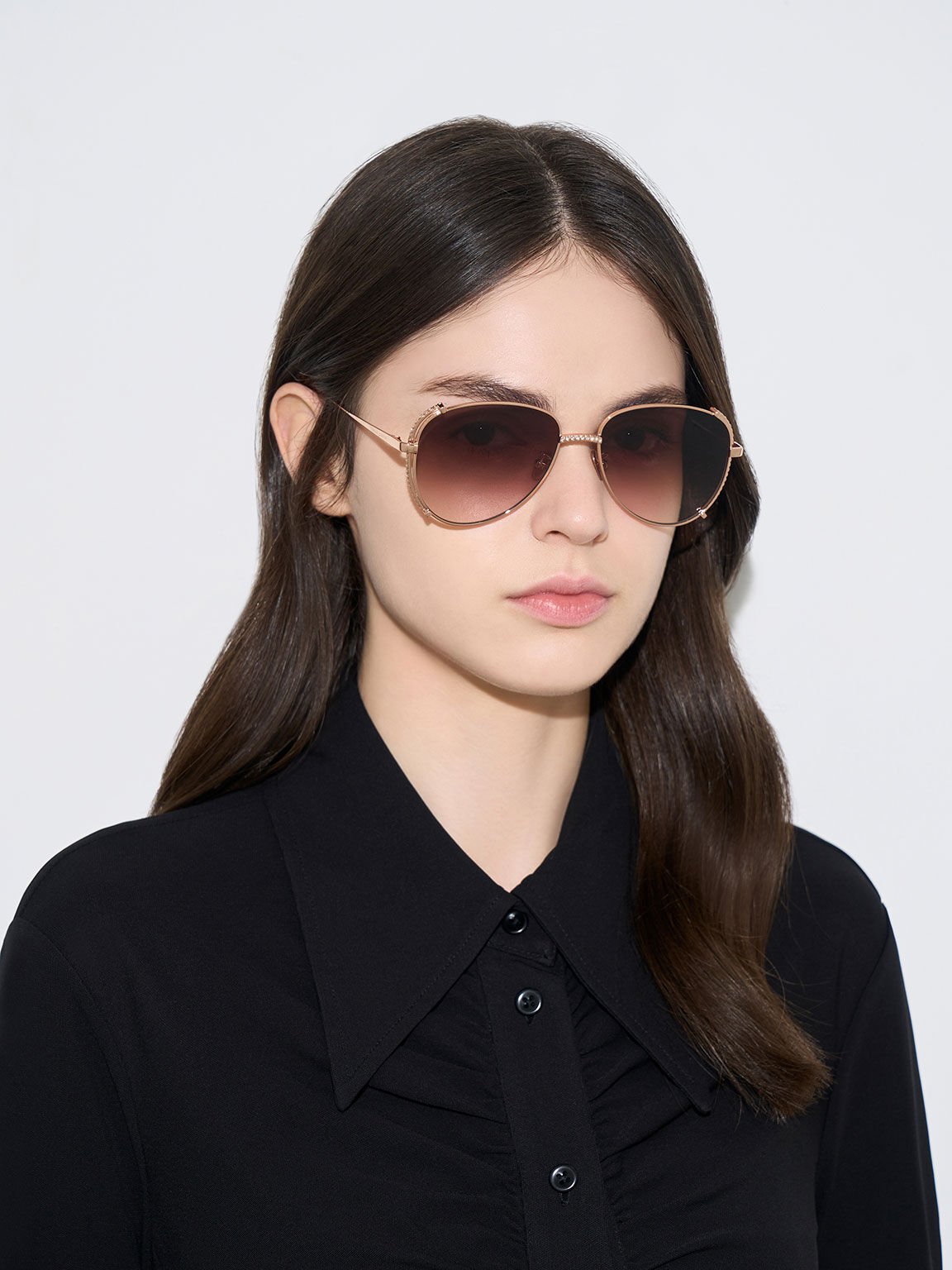
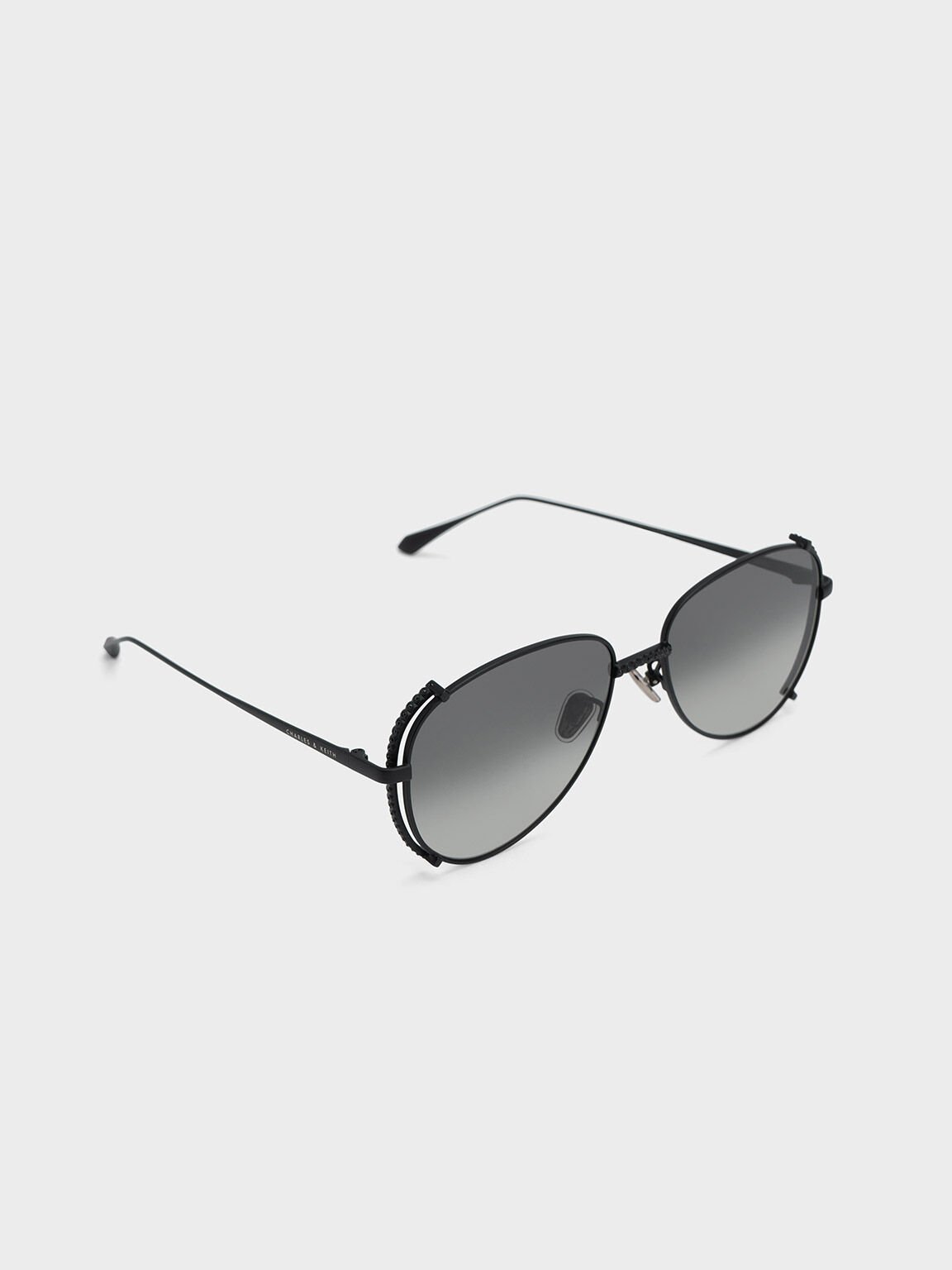
Aviator sunglasses were originally invented during World War I to shield a pilot’s eye from the sun’s glare when flying in the day. As such, they are highly practical, with teardrop-shaped lenses that provide optimal coverage and a sleek metal frame to balance out their over-sized silhouette.
The aviator’s iconic shape cements its status as a fashion classic — while wearing these, one is certain to appear confident and sophisticated. Due to their flattering design, they complement various face shapes, particularly round ones as their angular frames add definition and provide a pleasing contrast.
Wayfarer Sunglasses
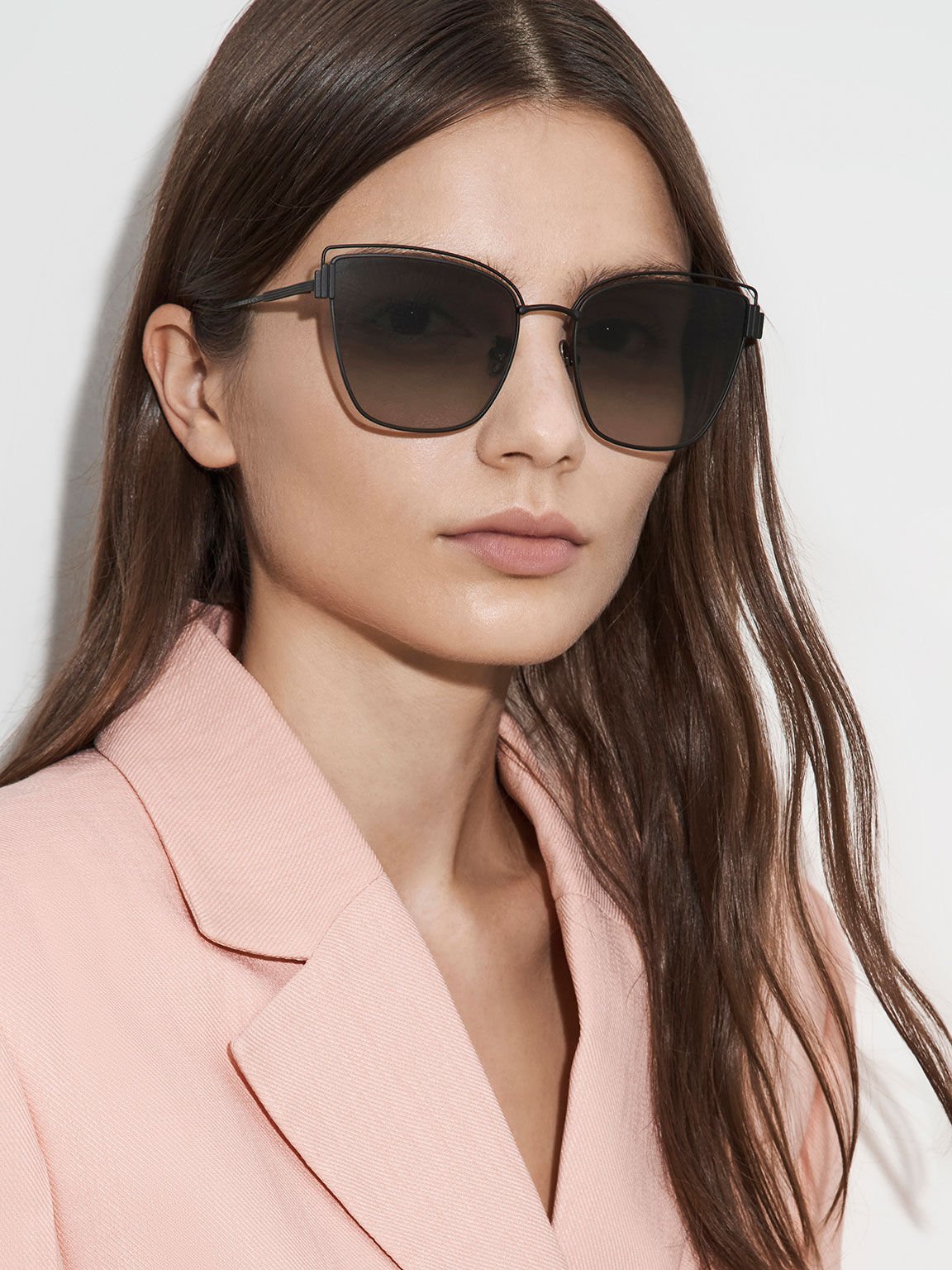
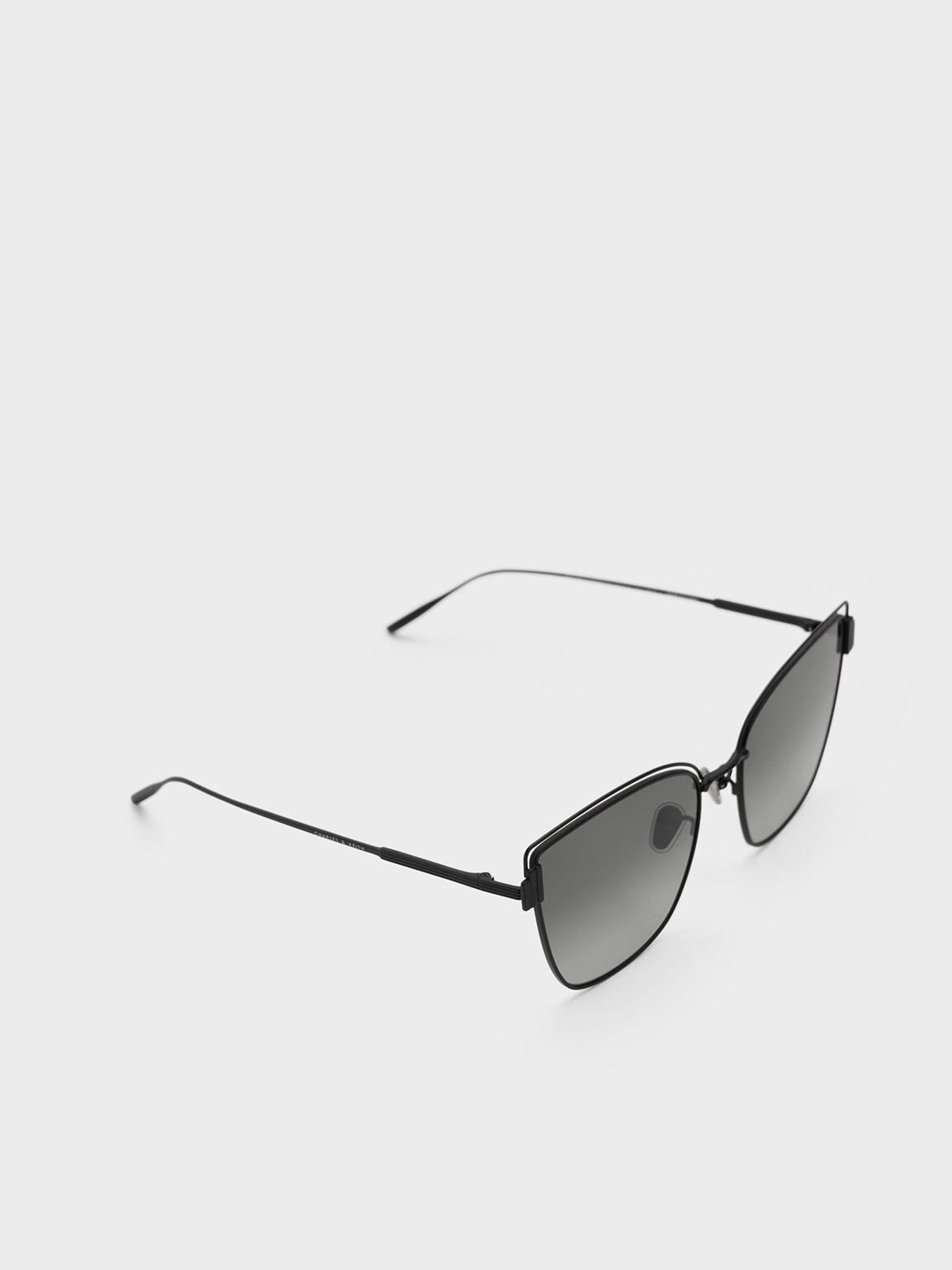
Wayfarer sunglasses feature thick plastic frames with relatively small lenses. The lenses are usually rectangular or trapezoidal, and the frames feature a slight flare at the top outside corners, which are adorned by metallic rivets.
Popularised by celebrities like James Dean, Bob Dylan, and Andy Warhol, they have a distinctive aesthetic and are often associated with the rock 'n' roll lifestyle. Decidedly minimalist and pared down, they appeal to a variety of style personalities.
When it comes to face shapes, they work particularly well on oblong, oval, and round faces due to their angular silhouette.
Cat-eye Sunglasses
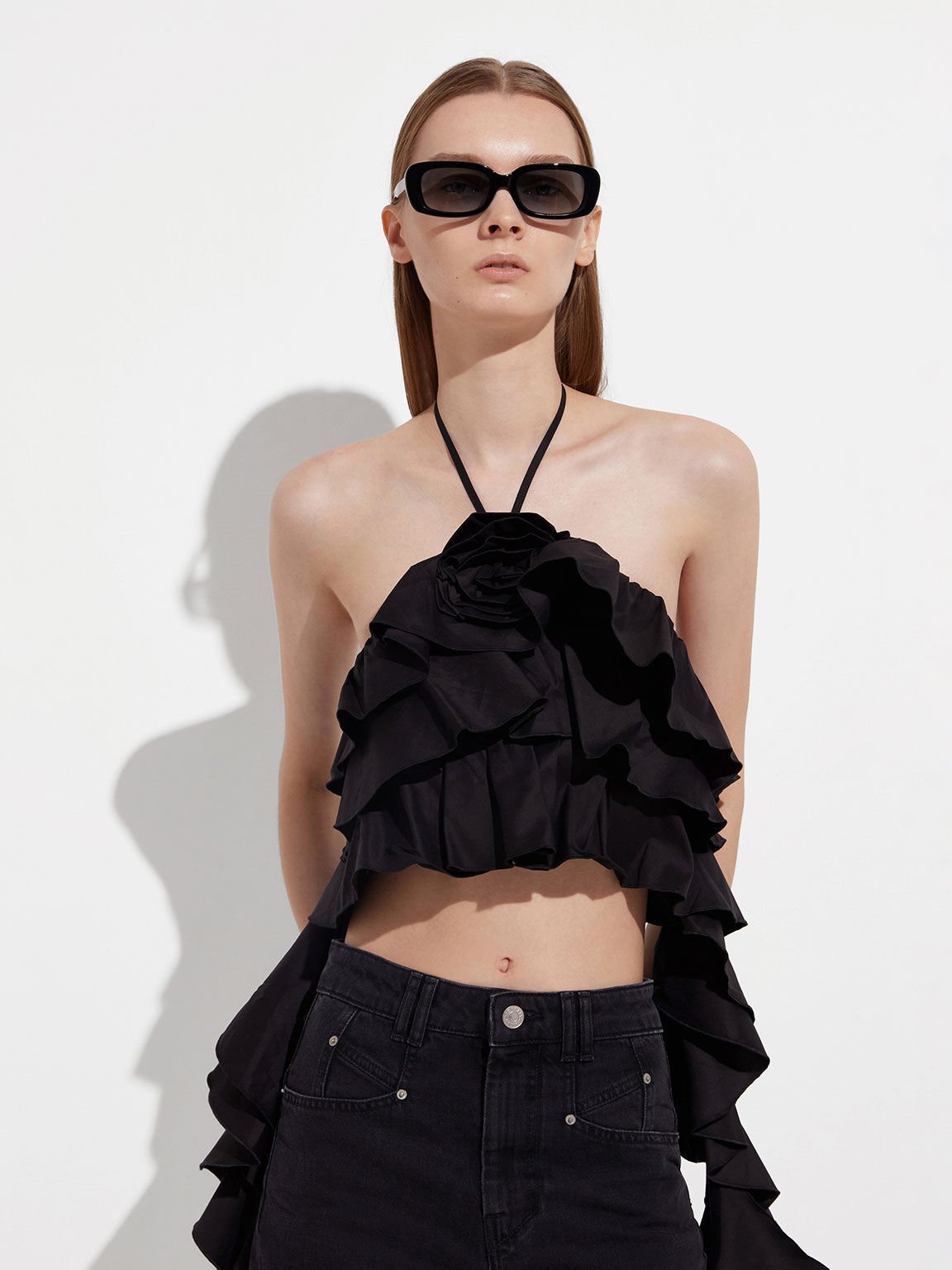
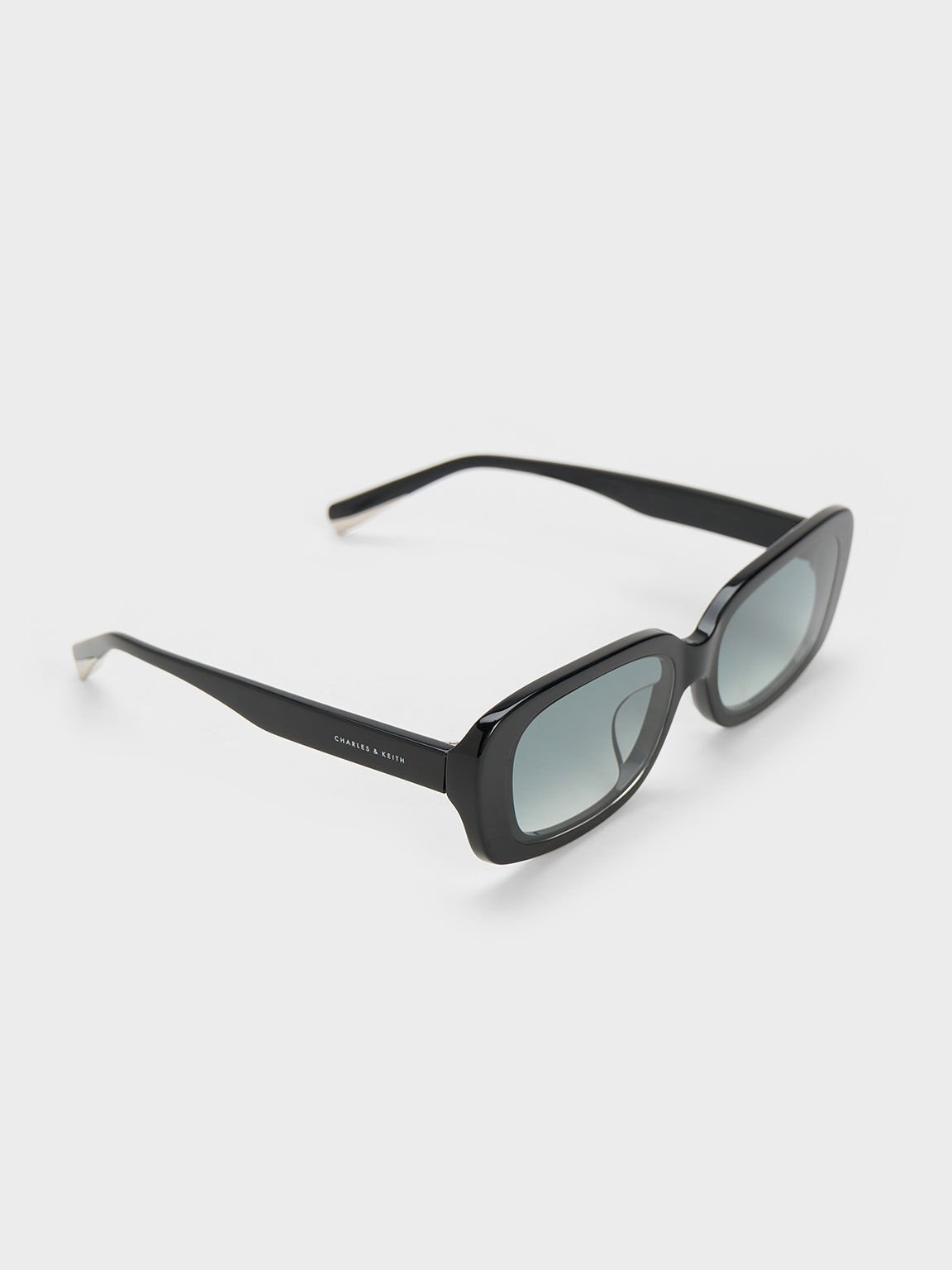
Cat-eye sunglasses, invented in the 1920s by Altina Schinasi Miranda and inspired by Venetian masks, feature dramatic upswept corners that mirror a cat’s eye shape. They are widely recognised as the first feminine eyewear, with iconic figures like Marilyn Monroe, Grace Kelly, and Audrey Hepburn as fans, turning them into symbols of female empowerment and sophistication.
Versatile by nature, cat-eye sunglasses are a timeless classic that complement nearly every face shape when chosen thoughtfully. For instance, smaller pairs flatter heart-shaped faces, while angular silhouettes enhance the allure of round faces.
Round Sunglasses
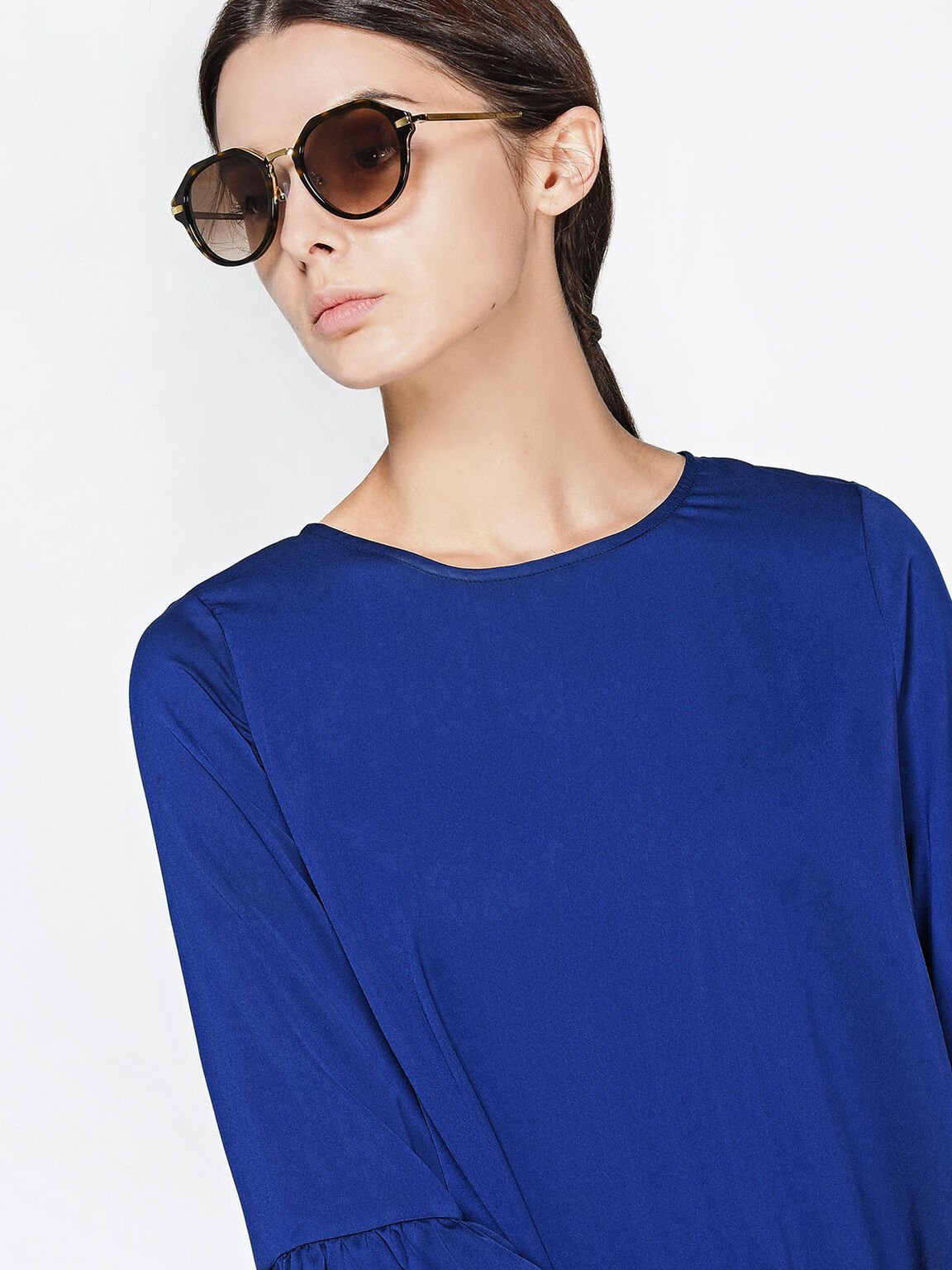
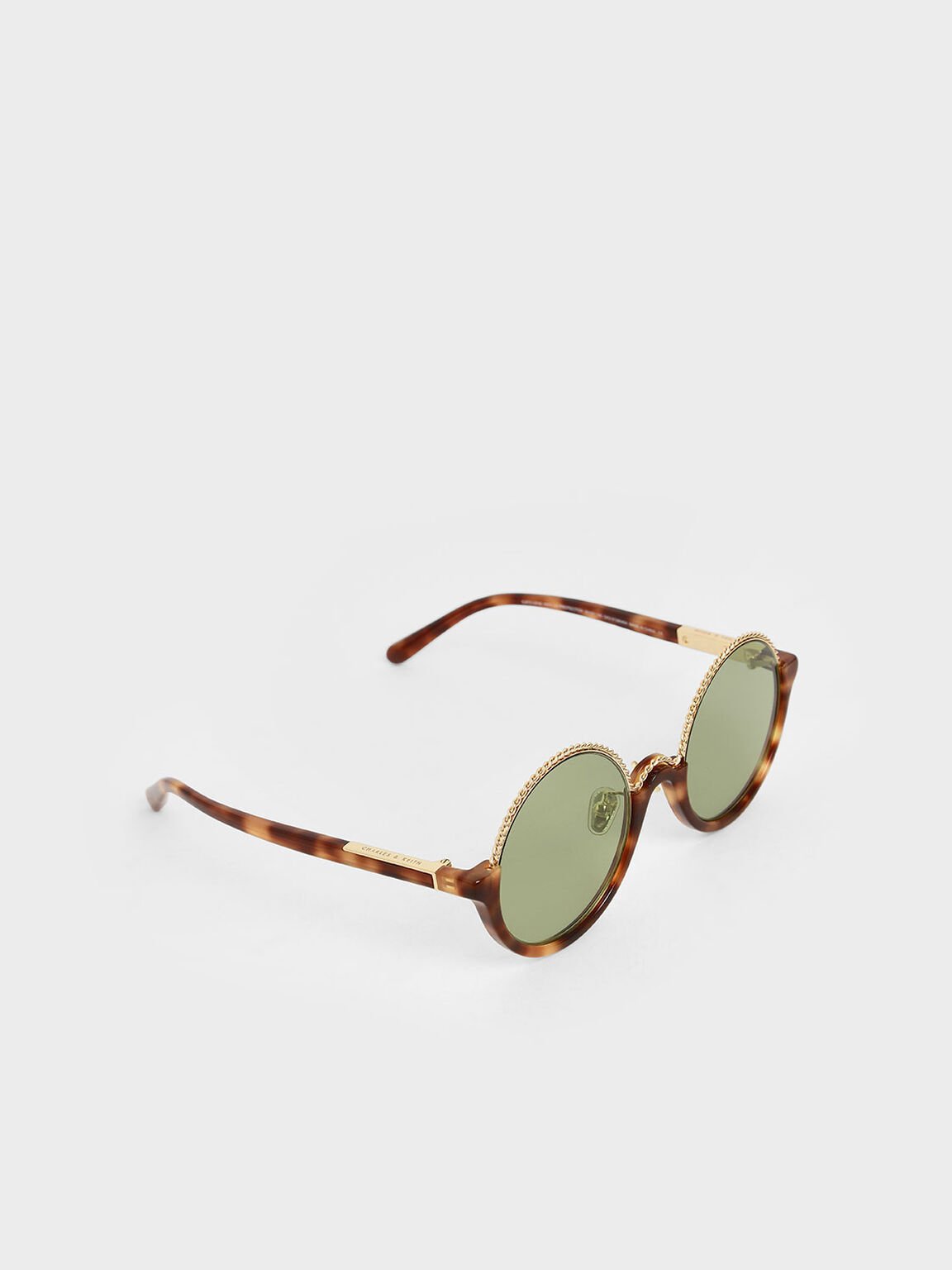
Round sunglasses exude a timeless charm with their circular frames. Their classic design and retro appeal make them a staple in the world of eyewear — they embody a sense of effortless cool. Popularised by cultural icons such as John Lennon and Ozzy Osbourne, they remain an enduring symbol of non-conformity and free-spirited expression today.
Round sunglasses, with their curved frames, complement angular features by softening their sharp lines. Hence, they will suit people with square faces best. They will also complement heart-shaped faces, as they draw the eyes away from the forehead to give the face a more symmetrical appearance.
Square Sunglasses

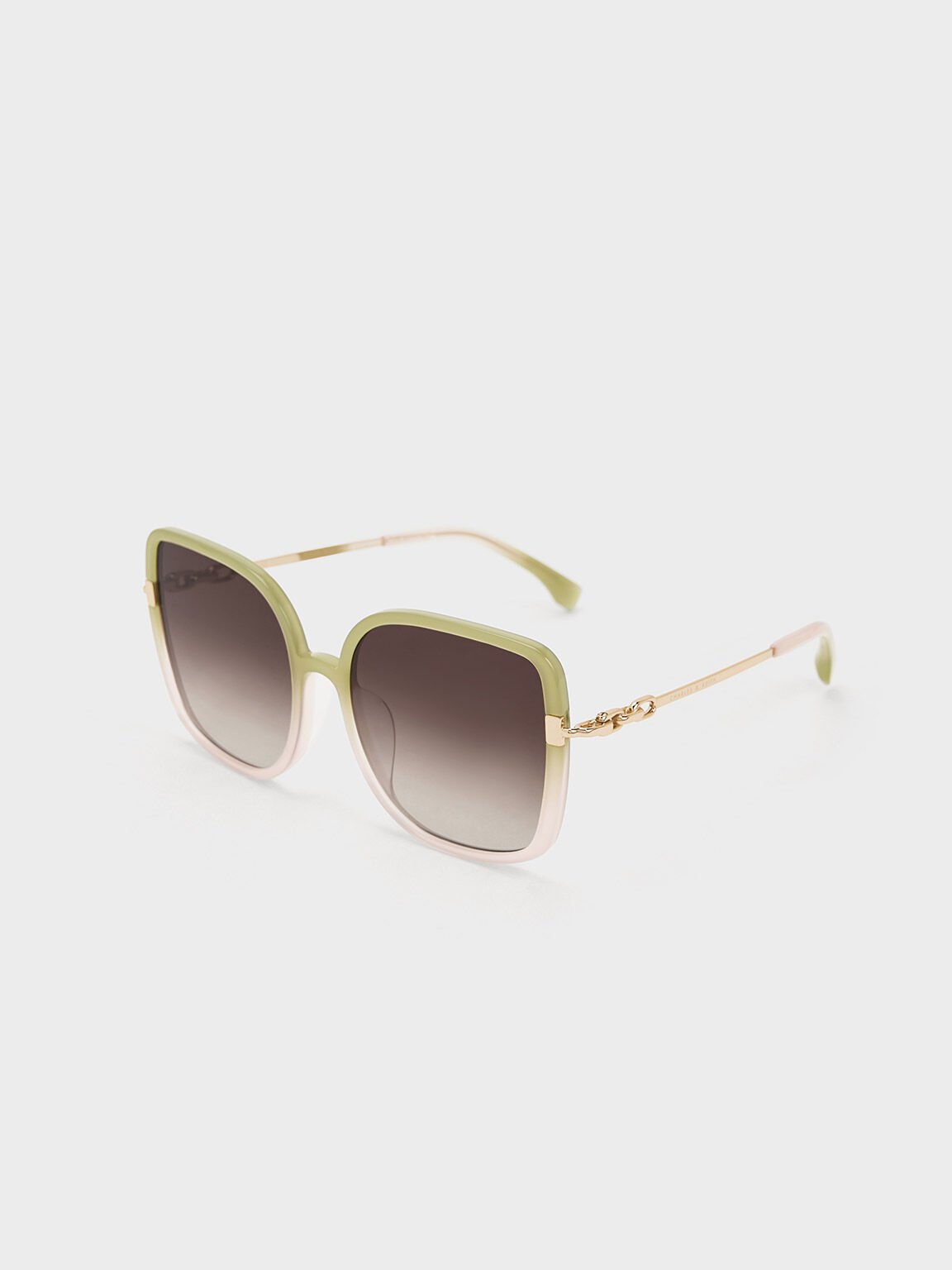
Square sunglasses are characterised by their angular frames and bold lines. They have their roots in the rise of sleek geometric designs, which was deemed to be synonymous with modernity.
Ideal for those with round or oval faces, square frames provide balance by adding definition to softer contours. The sharp angles of square sunglasses create a striking contrast with rounded features, enhancing facial symmetry. Even if you don’t have a round face, square sunglasses will still be flattering — the bottom of a square frame can help create the appearance of stronger cheekbones.
Rectangular Sunglasses
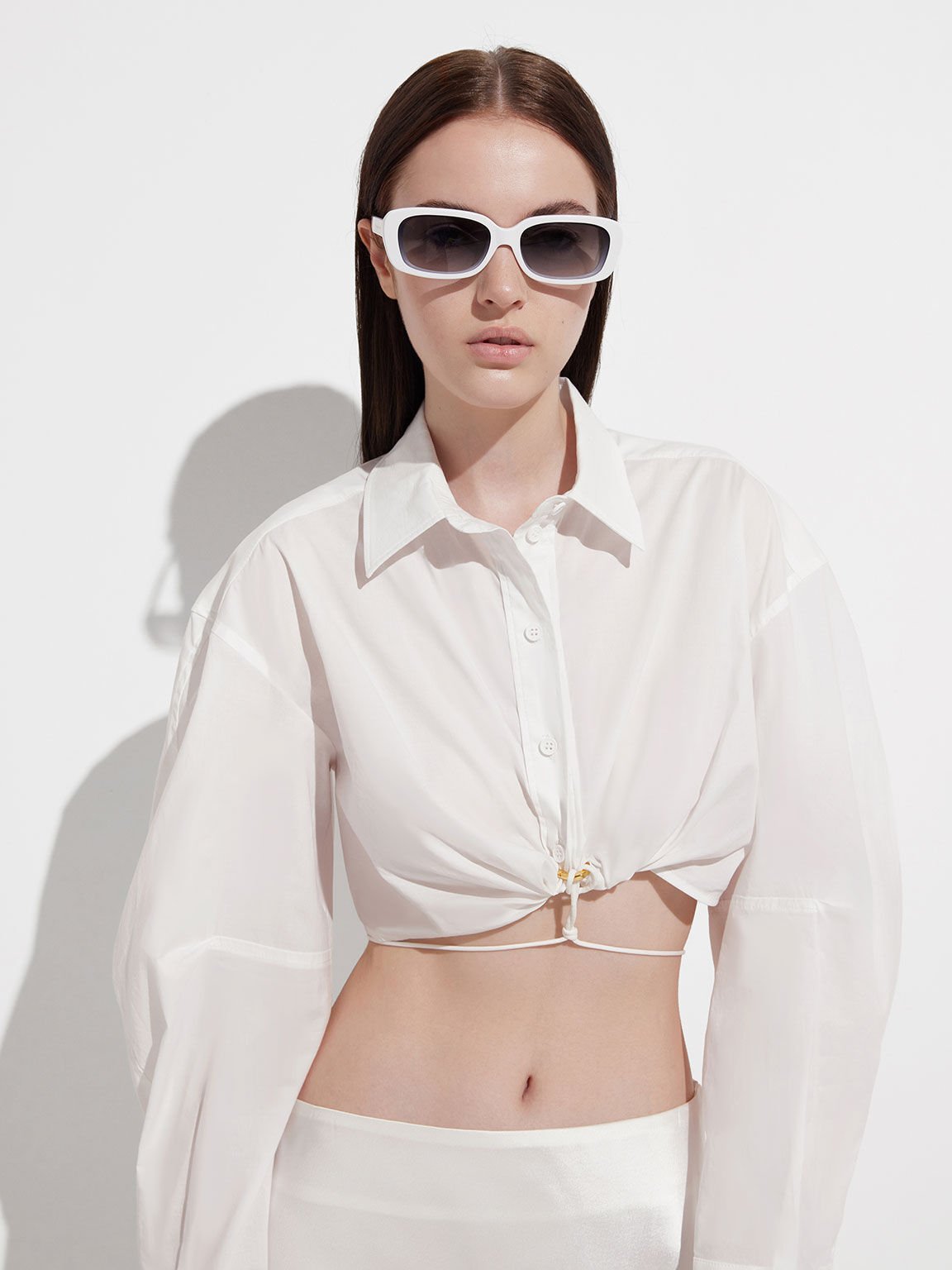
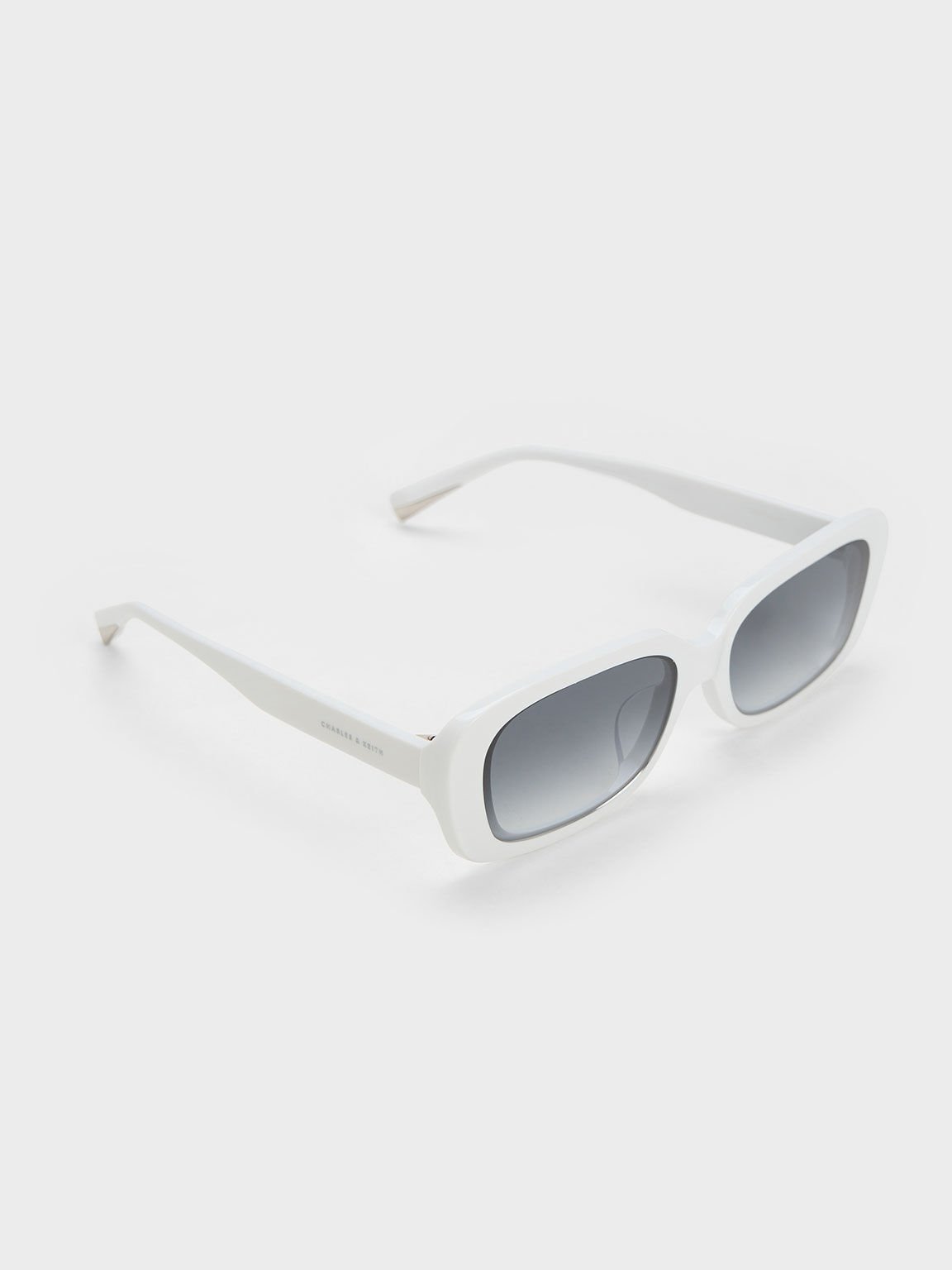
Featuring bold and distinctive angular shapes, rectangular sunglasses are similar to square sunglasses — however, their frames are often longer in width than they are in height. Their clean lines and streamlined design make them a timeless staple, embodying understated elegance.
Rectangular sunglasses offer versatility, enhancing the wearer's facial features in various ways. They add structure to round and oval faces to create a more defined appearance. Conversely, they complement angular faces by accentuating their strong facial structure.
Shield / Wraparound Sunglasses
Shield sunglasses, also known as wraparound sunglasses, feature a single lens that covers the entire eye area. They typically have thin rims or are completely rimless.
Designed for outdoor activities, shield sunglasses are synonymous with a sporty aesthetic.
Shield sunglasses gained popularity during the 2000s when bold, oversized eyewear was all the rage. Today, they have made a comeback in part due to Gen Z’s fondness for the era.
As shield sunglasses are available in various shapes and sizes, they have the versatility to complement any face shape depending on the specific style and fit of the sunglasses.
Browline / Clubmaster Sunglasses
Browline sunglasses look exactly as they sound. The upper portion of the frame is thicker than the lower, resembling eyebrows framing the eyes. This bold upper portion is usually made from plastic, while the rest of the frame is made of metal.
With its top-heavy design, browline sunglasses are ideal for diamond face shapes because they help add bulk to their narrow foreheads and give them a more proportional appearance.
Oblong face shapes, like rectangles and ovals, will also benefit from browline sunglasses, as they serve to even out the proportions of the face. With a larger surface area, these face shapes will find browline sunglasses particularly flattering.
Butterfly Sunglasses
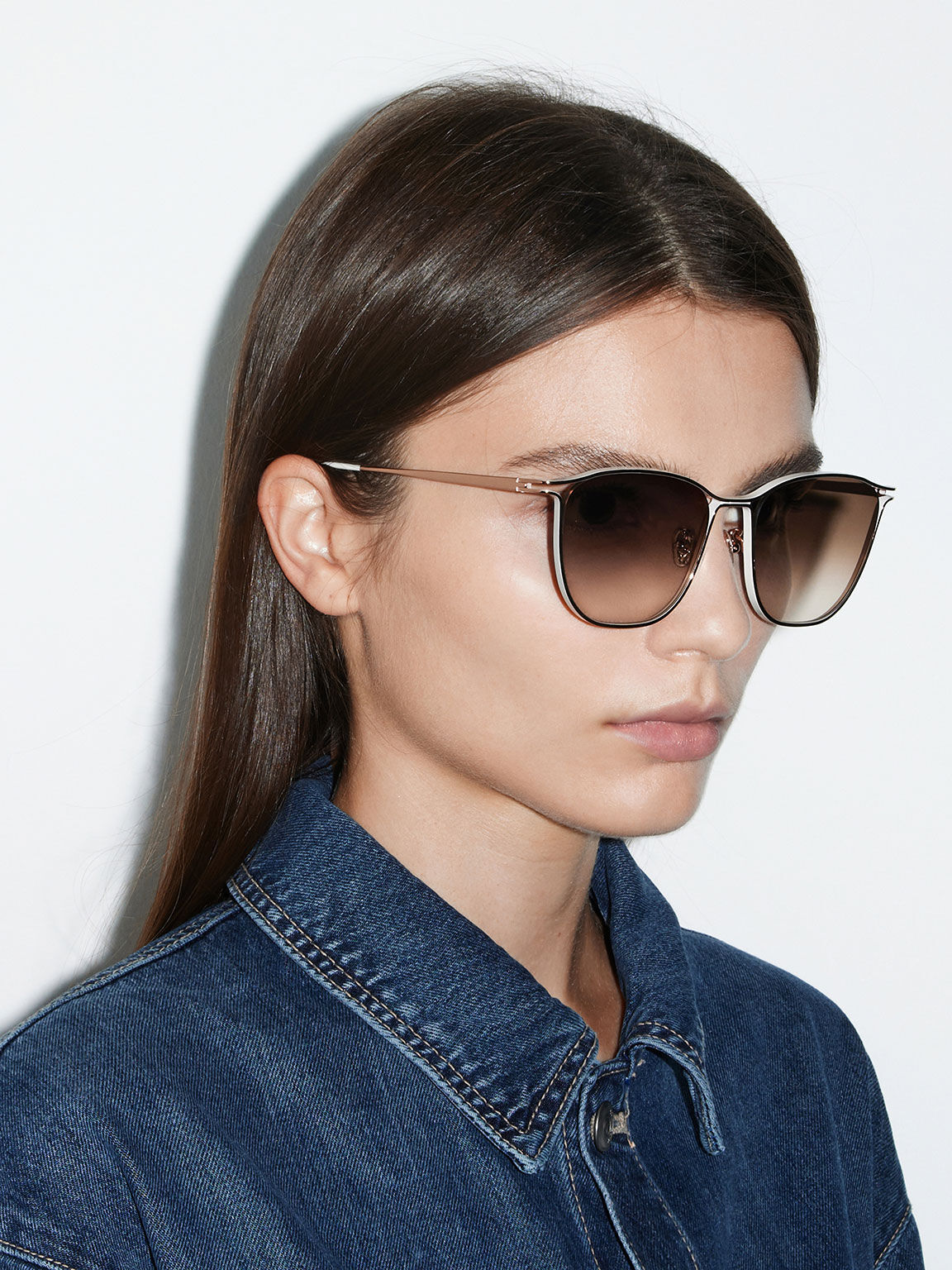
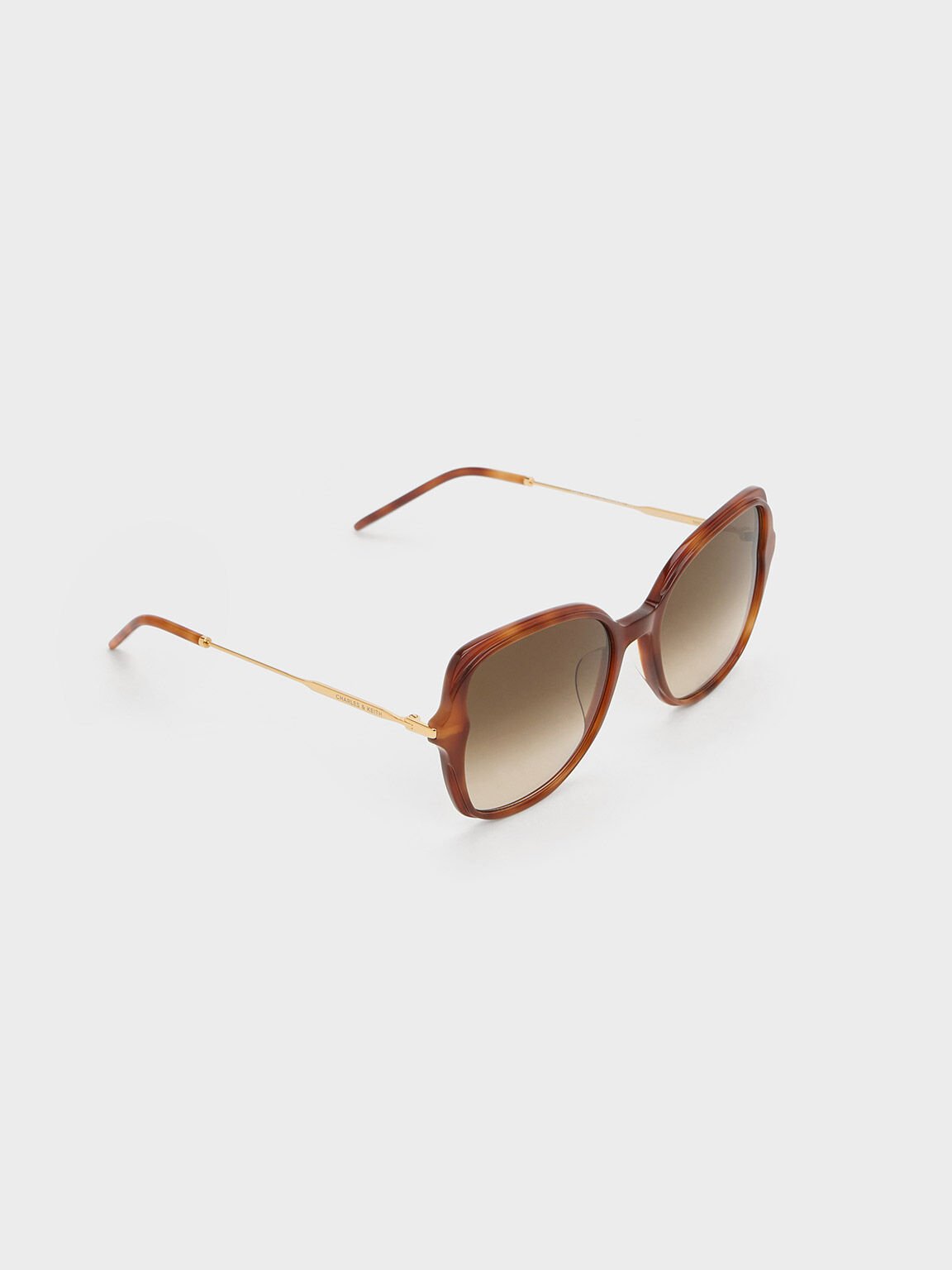
Butterfly sunglasses derive their name from their oversized and upswept frames that resemble the graceful wings of a butterfly. They are an iconic design that people reach for when they want to make a bold fashion statement.
While butterfly sunglasses can complement a variety of face shapes, individuals with heart-shaped faces will find them particularly flattering as the wider upper frame helps to balance out the width of their foreheads while accentuating the eyes and cheekbones.
Conversely, individuals with round or square faces may find that the dramatic design of butterfly sunglasses accentuates their facial features too much. Butterfly sunglasses are also not the most suitable choice for small faces as they may create an unbalanced or disproportionate look, regardless of the face shape.
Navigator Sunglasses
Navigator sunglasses are essentially aviator sunglasses but with squared frames instead of rounded ones. They offer the same optimal coverage as aviators.
With a structured silhouette, navigator sunglasses look best on round and oblong faces, although they can complement other face shapes as well. Their sleek and elongated design helps to add definition to soft curves and visually lengthen the face, making it appear slimmer and more balanced.
Geometric Sunglasses
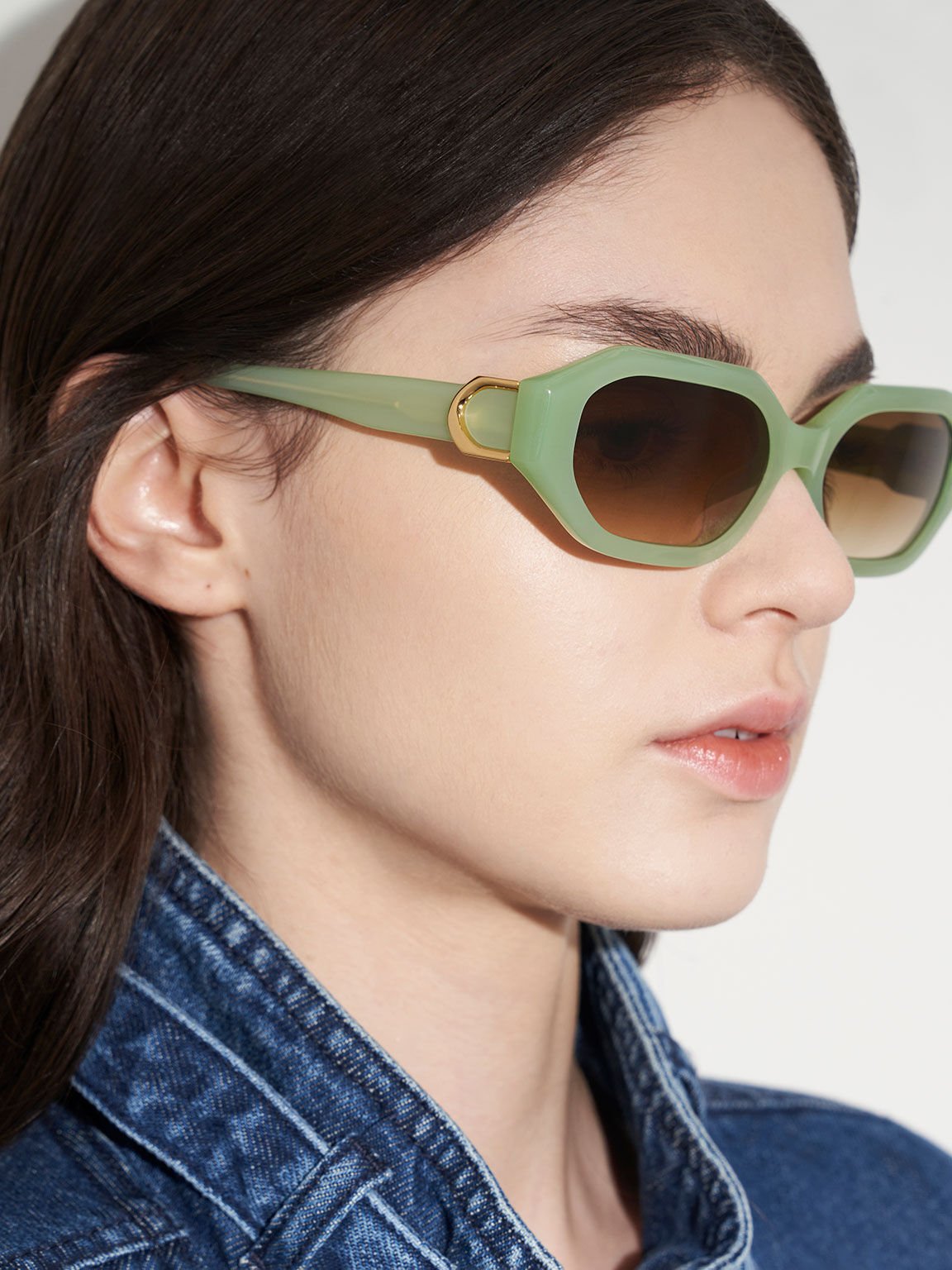
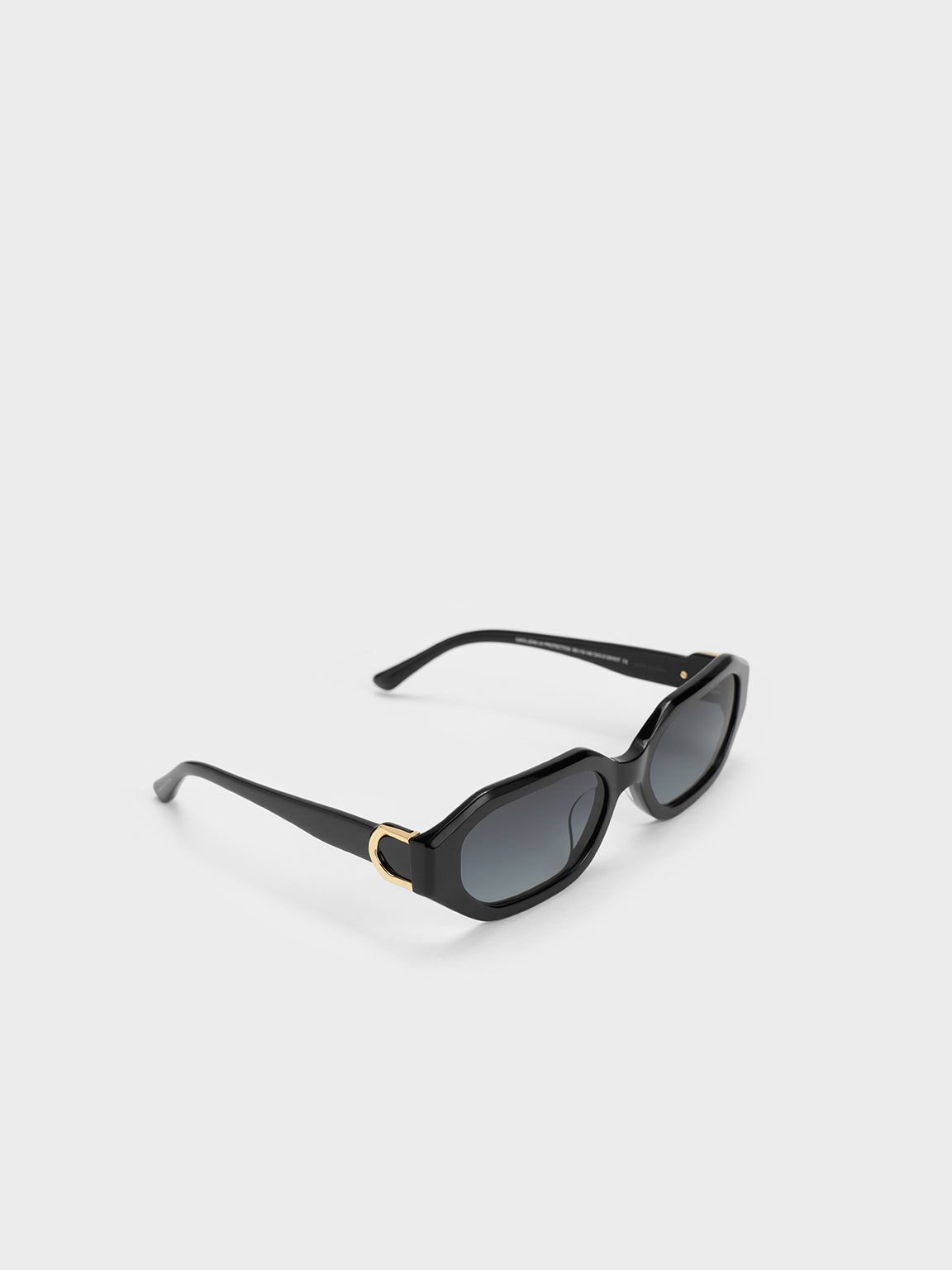
Although round, square, and rectangular sunglasses fall under the category of geometric sunglasses, this classification encompasses a much broader range. Geometric sunglasses are eyewear with lenses in various geometric shapes, including octagons, hexagons, diamonds, trapezoids, and even heart shapes. These sunglasses tend to inject a touch of fun and whimsy with their eye-catching and playful forms. Available in a variety of shapes and sizes, there is a pair for every face shape.
Lens Types
Whether you are looking for a pair of functional sunglasses for everyday wear, moderate sports activity or a fashion accessory, there is a wide range of lens types, including a variety of coloured lenses, to choose from.
Polarised Lenses
Polarised lenses, also known as anti-glare, are specially treated lenses with an invisible filter to reduce, block and minimise glare as well as reflections from the sun or any other light source. It is especially ideal for outdoor activities, such as fishing, running and snow sports.
Mirrored Lenses
Mirrored lenses come with a reflective coating. These coatings help reduce the light that passes through the lens, reducing glare while creating a dramatic effect. Equal parts glamorous and functional, this lens type is popular as a statement accessory, whether worn indoors or outdoors.
Gradient Lenses
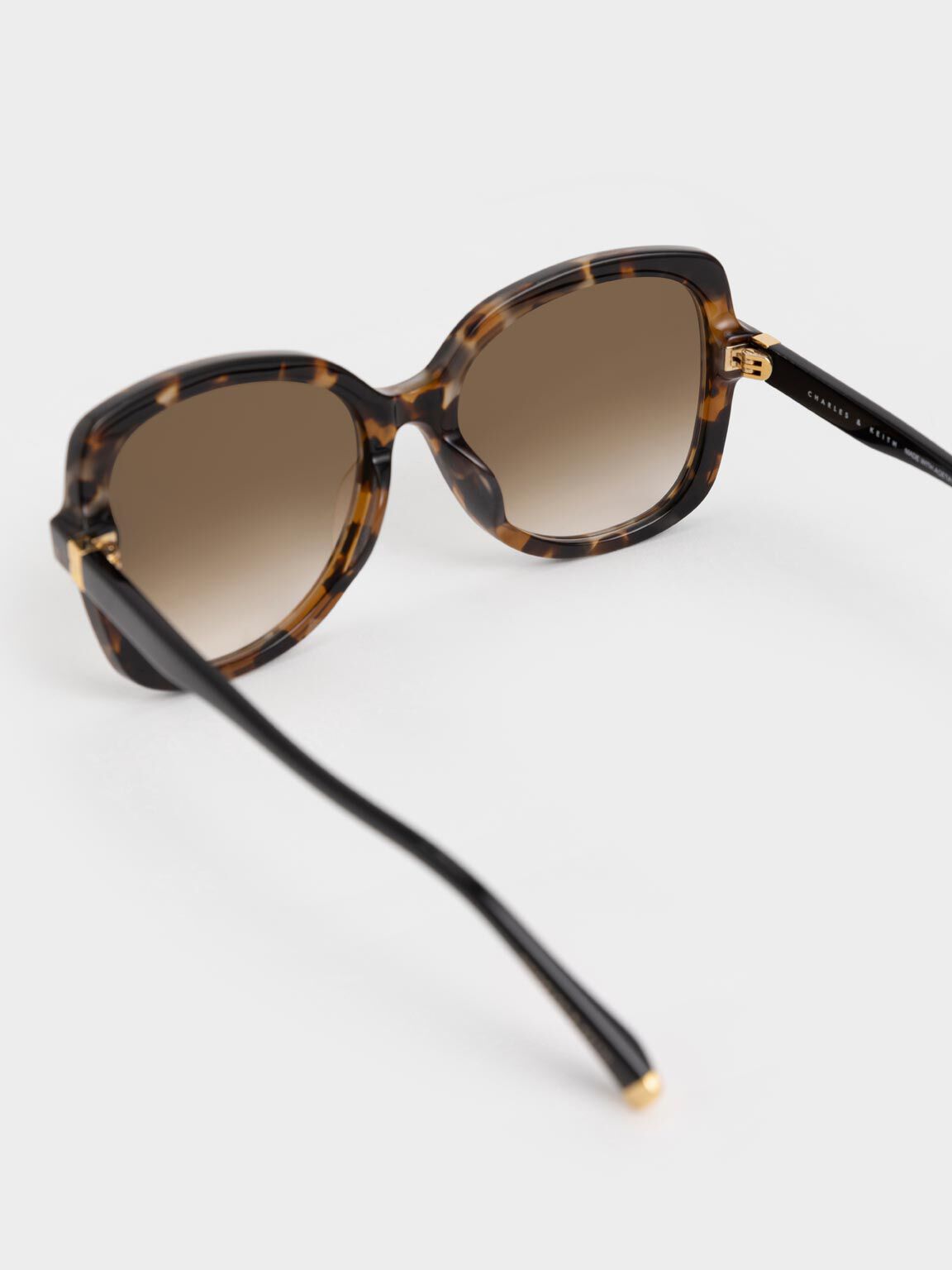
Gradient Lenses
Gradient lenses, as the name suggests, feature a gradual transition from a darker tint at the top to a lighter tint at the bottom. Perfect for those with sensitive eyes who require protection from bright lights or the sun but still want to see clearly in other areas, particularly in low-light conditions.
Tinted Lenses
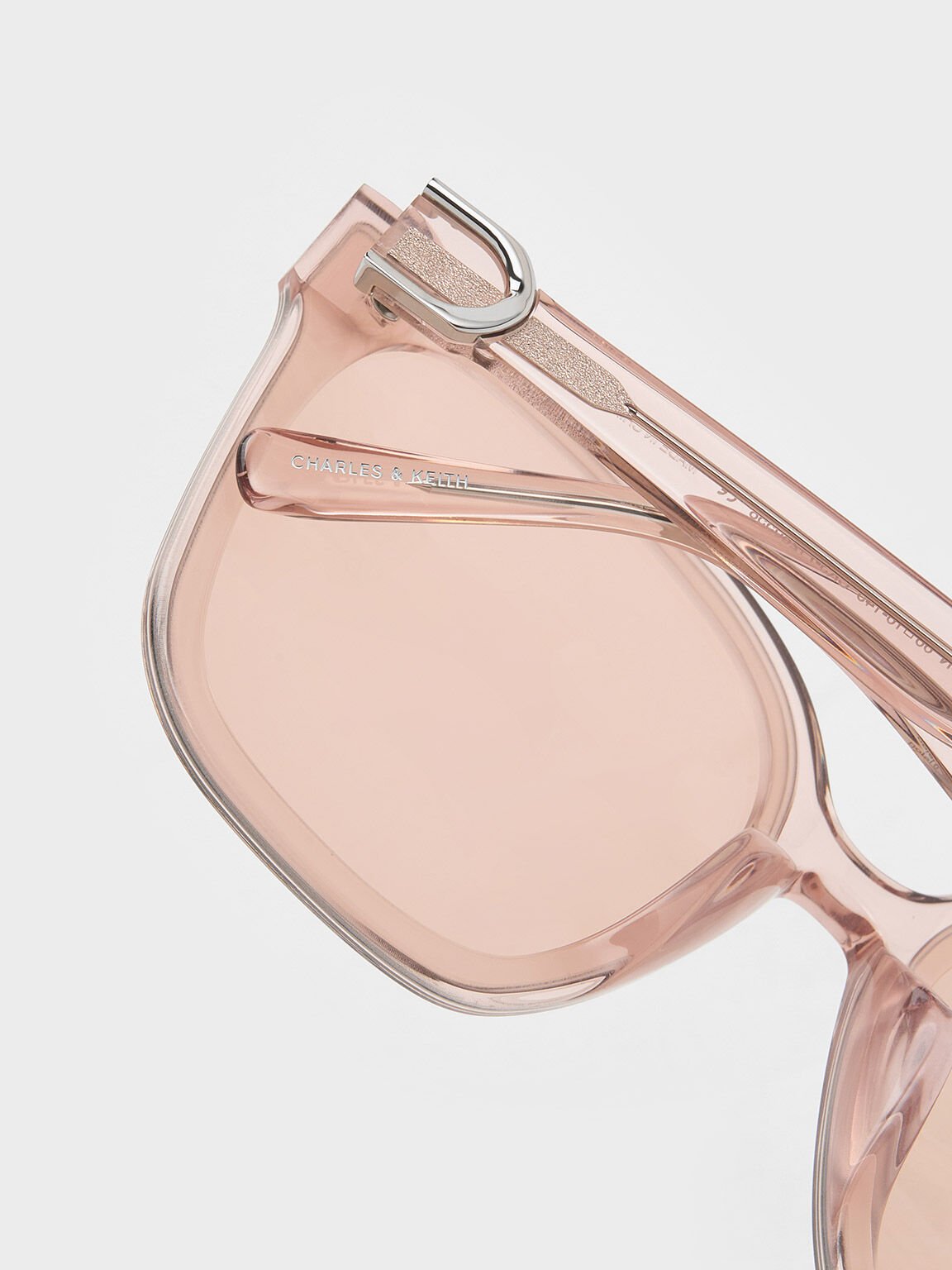
Tinted Lenses
Combining fun and function, tinted lenses come in a variety of colours. Lighter tints, such as pink and white, can add a playful and stylish touch to your look while darker tints like grey and brown are classic, fail-safe options that can provide more visual comfort in different light and weather conditions. They are created by applying a layer of uniform UV-blocking coat on the lenses. For this lens type, the colour will remain the same throughout regardless of the sunlight or light conditions.
Photochromic Lenses
On the other side of the spectrum, photochromic lenses come with a special coating that reacts and changes to varying light conditions, causing them to darken in brighter light and lighten in lower light. This lens type is especially ideal for all conditions, as they constantly adjust and recalibrate to ensure that the optimal amount of light enters your eyes, whether indoors or outdoors, in low light or bright light conditions.
UV-Protected Lenses
On the other side of the spectrum, photochromic lenses Similar to tinted lenses, UV-protected lenses are made with a special layer of UVA- and UVB-blocking coat that offers maximum UV protection and coverage for your eyes, as well as the areas around them.
Glass Lenses
Glass lenses are a great alternative to plastic lenses, offering a higher quality of wear — they are thinner with exceptional scratch resistance. Depending on your lifestyle and personal preference, glass lenses are a good option for everyday use.
Blue Light Lenses
Blue light lenses feature an optical lens filter that is designed to filter out blue-violet rays emitted by digital screens. They are especially ideal for reducing eye fatigue and strain caused by the prolonged usage of digital devices.
Choosing the Right Sunglasses for Your Face Shape
For the most flattering fit, it is helpful to identify your own face shape before deciding which frames would best suit and accentuate your features.
Identifying Your Face Shape
Take a look at yourself in the mirror in a well-lit area. Pay attention to these key areas: face length from the forehead to the chin, forehead width, cheekbone width, and the jawline width. How do they compare to one another? Is one area of the face noticeably lengthier than the others, or are they all about the same length? Is one part curvier or more angular than the others? For a better estimate, consider grabbing a measuring tape and a notebook to jot measurements in.
Round Face
If your face width and length are the same, you have a round face shape. It is also characterised by a wide hairline, rounded jaw and fullness in the cheekbone area.
Oval Face
A combination of square and round face shapes, an oval face is recognisable by a wider cheekbone width compared to the forehead width. Your face should also be longer than it is wide, with a rounded chin and jawline.
Square Face
You have a square face if your forehead, cheekbones and jawline are all the same width. The hairline and jawline are also typically wider, with more angular contours.
Heart Face
If you have a widow’s peak, you have a heart-shaped face. Other features include a cheekbone width that is wider than your forehead, a forehead that is wider than your jawline, and an angular, tapered chin.
Diamond Face
A diamond face shape is recognisable by the presence of high cheekbones that are wider than the forehead. The forehead and jawline are also noticeably narrower, with fullness at the chin.
Matching Face Shape With Sunglass Styles
After you have identified your face shape and defined the proportions of your features, it will be easier to pick out styles that highlight and enhance your face.
Round Face
To balance out the curves of the rounded face shape, angular frames like square and rectangular sunglasses will define and sharpen the face to create a slimming, elongating effect. To create visual contrast, look for frames in deeper hues like black and brown that are affixed with dark tinted lenses. If you are looking for a more distinctive pair, opt for classic aviator sunglasses — the double-bar bridge adds visual weight to the eyeline, which will instantly lift the face.
Oval Face
To accentuate the cheekbones, aviator sunglasses are a good pick for oval face shapes. The straight-edged brow bar introduces angular contours for a flattering contrast, while the rounded lenses complement and play up the soft curves of the face. For an even sharper silhouette, cat-eye sunglasses direct attention upwards to the cheekbones. You could also consider bold wraparound styles that will draw attention to the eyeline.
Square Face
Soften the outlines of your face with rounded sunglasses. They will balance out the angular contours of your face with the visually pleasing symmetry of circle-shaped lenses. To vary the proportion of your features, look for striking details like mirrored lenses and two-toned colourways to direct the eye upwards. Alternatively, cat-eye sunglasses will lift and elongate the face while maintaining a strong facade — go for a sleek metallic finish or clear frames in a fun hue to make them the focal point.
Heart Face
Larger frames will suit heart-shaped faces — think geometric, square and browline styles. These frames introduce structure to softer features and anchor the tapered jawline at the same time. To make a striking, visually arresting statement, opt for geometric sunglasses that play around with the mix of curved and angular contours of your face. Or, for a softer look, rounded silhouettes will highlight the curves of your face.
Diamond Face
Draw attention to your pronounced cheekbones and add bulk to your narrow forehead with wider-set sunglasses. Oval sunglasses mix elements of rectangular and rounded styles to create a flattering in-between that will gently soften the cheekbones yet define the jawline and forehead. Cat-eye sunglasses play off the angular cheekbones to create a fiercer look, while browline frames are a more approachable alternative.
Additional Tips For Choosing Sunglasses
Picking out sunglasses based on your face shape is a good starting point, but there is no fixed rule. Different frame sizes have varying effects on your specific features, and choosing between metallic finishes depends on your skin tone. Silver complements cooler skin tones, gold looks better on warmer undertones, and rose gold is the perfect in-between for nearly every skin tone. Comfort is also another consideration — the profile of your nose-bridge will determine which frames are better suited. Perhaps the biggest factor to think about is your personal style and preferences — nothing is off-limits, and experimenting with a range of silhouettes will help you find your unique fit.
Not only do sunglasses serve the very important function of protecting your eyes from harmful UV rays, but they are also an effortless way to express your style personality and mood of the moment. Whether you opt for classic aviators or a dramatic cat-eyed pair, the appeal of sunglasses lies in your ability to switch them up and experiment with shape, size and colour. We hope that this guide will help you find your perfect pair of sunglasses — you may even be inspired to build up a collection of flattering shades that will bring your outfits to the next level.
